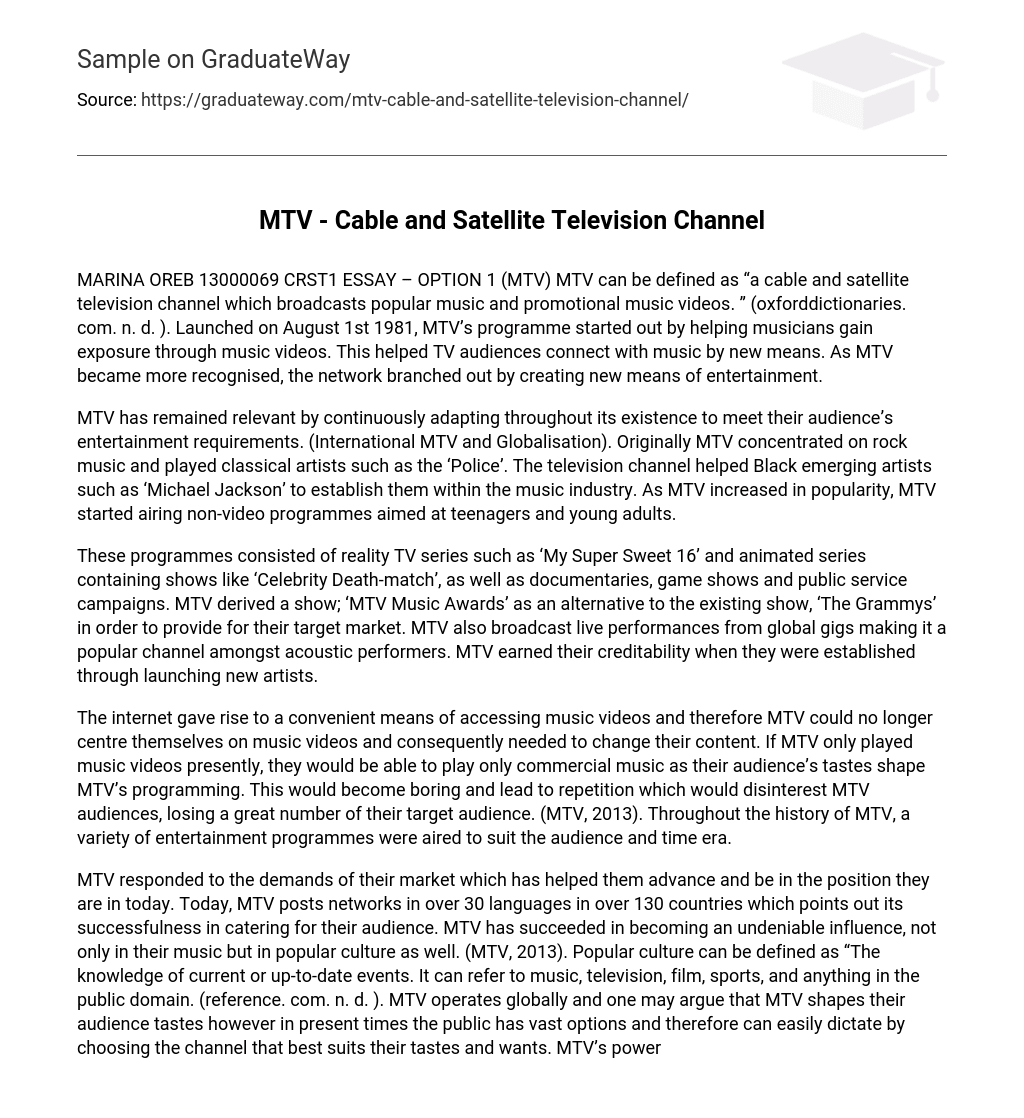MTV, a television channel launched on August 1st, 1981, according to oxforddictionaries.com, aimed to promote popular music and its videos for musicians’ exposure and audience connection in unique ways. Over time, MTV’s popularity led to an expansion of its entertainment offerings.
MTV has remained current by continually adjusting to fulfill the entertainment desires of its viewers. Initially, MTV centered on rock music and highlighted legendary musicians such as the ‘Police’. Additionally, the channel played a substantial part in promoting emerging Black artists like ‘Michael Jackson’ within the music business. As MTV grew more popular, it introduced non-video programs aimed at teenagers and young adults.
MTV showcased a diverse range of programs, encompassing reality TV series such as ‘My Super Sweet 16’, animated series like ‘Celebrity Death-match’, documentaries, game shows, and public service campaigns. In order to appeal to their desired viewership, MTV developed the show ‘MTV Music Awards’ as an alternative option to ‘The Grammys’. Furthermore, the channel gained popularity by airing live performances from global concerts, which made it a preferred platform for acoustic performers. Moreover, MTV reinforced its standing by endorsing up-and-coming artists.
The internet revolutionized the way music videos are accessed, causing MTV to shift its focus away from exclusively featuring music videos. If MTV were to solely concentrate on airing music videos, they would be limited to playing only popular commercial songs because of the impact of audience preferences on MTV’s content. This restriction would lead to monotonous and tiresome programming, resulting in reduced viewer engagement and the loss of a significant portion of their intended audience (MTV, 2013). Throughout its existence, MTV has aired a diverse range of entertainment programs designed to cater to different audiences and time periods.
MTV’s success is due to its ability to meet the demands of its market. With networks in over 130 countries and broadcasting in more than 30 languages, MTV effectively caters to a diverse audience. This has made them a major player in both the music industry and popular culture as a whole. According to MTV (2013), popular culture includes current events, music, television, film, and sports that are accessible to the public (reference.com, n.d.).
Despite arguments that MTV’s global presence influences audience preferences, individuals now have an abundance of channel choices that cater to their personal tastes and desires. MTV’s adaptability has been crucial in consistently attracting its intended viewership. As pioneers in popular culture, MTV has become an iconic figure, inspiring the growth of visual media culture.
Throughout the years, MTV has greatly influenced global popular culture, emerging as a dominant force in shaping the cultural preferences of younger generations. This impact is evident worldwide through the establishment of various international channels such as MTV China, MTV Canada, and MTV India. These diverse channels all originate from the same mass media source: MTV. The success of MTV can be attributed to its constant adaptation and customization of programs to cater to its target audience (MTV, the medium was the message, 2005).
MTV Europe started in Germany in 1989. They announced their arrival by combining footage of the Berlin wall collapsing with music and the youth of Berlin waving MTV flags. MTV believed that they had successfully connected with German youth by incorporating elements that were important to them. However, MTV overlooked the fact that their content was not tailored to the German market. The language barrier between English and German made it difficult for German youth to understand MTV’s music and reality TV shows, resulting in a lack of popularity for MTV.
MTV faced competition from existing German music channels, prompting them to create a dedicated channel for Germany. The channel’s audience grew to approximately 2.7 million. MTV’s approach to each market has varied, recognizing the need for a tailored strategy in each. Through its international and local presence, MTV has made significant impacts on the music and advertising industries. As a cultural influence for younger generations, MTV influences social behavior.
MTV’s target demographic, consisting of individuals aged 16 to 20, is heavily influenced by the social norms and trends depicted in the Reality TV series broadcasted across the network. As a result, viewers aspire to emulate the behavior and actions of the reality stars, contributing to the establishment of fabricated and artificial trends that will shape our future. The impacts of globalization are evident in contemporary society, particularly through the growth of companies like MTV and their expanding global audience. In order to thrive in a rapidly evolving, consumer-driven culture, the entertainment industry must always be one step ahead of the general public.
MTV supports individuality and empowerment while celebrating the excitement of youth. Through its direct engagement with young individuals, MTV has formed a global community that revolves around the interests of young adults worldwide. In order to maintain its prosperity, MTV must acknowledge and embrace every aspect of youth culture to establish connections with as many teenagers as possible.
REFERENCES
- International MTV and Globalisation. Available at: http://www. charisselpree. com/research/MIT-CMS/mtv/international-mtv-and-globalization
- Reference. com. Available at: http://www. nswers. reference. com/information/terminology/what_is_the_definition_of_pop_culture





